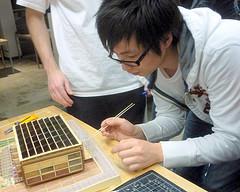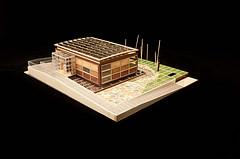
Third-year undergraduate architecture student Michael Deng works on a model for CCNY's Solar Roof Pod (below), one of the fianlists for the U.S. Department of Energy's 2011 Solar Decathlon.

A team from the Bernard and Anne Spitzer School of Architecture and the Grove School of Engineering at The City College of New York (CCNY) has been chosen as one of 20 finalists in the U.S. Department of Energy’s Solar Decathlon for 2011. As Team New York, the CCNY students will compete against colleges and universities from the United States, Belgium, Canada, China and New Zealand to design, build and operate the most affordable, attractive, effective and energy-efficient solar-powered house.
“The Solar Decathlon is a great project to educate and train the next generation of professionals in the emerging and needed fields of sustainable buildings and renewable energy,” said Dr. Jorge Gonzalez, a mechanical engineering professor who is one of three principal faculty advisors to the CCNY team. More than 100 students are expected to work on the project between now and fall 2011, when the completed structure will be put on public display on the National Mall in Washington and compete in 10 categories.
In addition, the project is a “great way to kick off CCNY’s new graduate program, Sustainability in the Urban Environment,” noted Christian Volkmann, an architecture professor who is also a faculty advisor. “It will help put the program on the map.”
The 1,000 square foot CCNY prototype, called a Solar Roof Pod, is designed with existing urban structures in mind. It will take advantage of the rooftops of buildings in New York and other large cities, which are generally underutilized, but can provide beneficial access to solar radiation, wind, water and roof-top greenery. As an add-on to these rooftops, the Roof Pod would enable urban dwellers to experience what it is like to live more sustainably.
“The prototype facility, if replicated, could have tremendous implications for PlaNYC,” added Hillary Brown, who is also an advising professor from the Spitzer School of Architecture. PlaNYC is New York City Mayor Michael Bloomberg’s initiative to reduce greenhouse gas emissions by 30 percent by 2017.
The modular, contemporary design solution uses lightweight, highly efficient and sustainable materials. A “building-block” assembly will enable each pod to be transported to a building’s roof via staircase or elevator. The Solar Roof Pod incorporates technologies such as photovoltaics for lighting and appliances and solar thermal collectors to supply hot water and power air conditioning systems. Myriad sensors and controls will minimize the use of energy and communicate with users.
The project consists of three phases. A design phase, which includes preliminary construction, will run from now through the fall 2010 semester. The actual structure will be built on the CCNY campus at an as-yet undetermined location during the spring 2011 semester and be open to the public at City College.
Early during the fall 2011 semester, the completed structure will be taken apart and shipped to the National Mall in Washington, where it will be reconstructed and compete against buildings produced by the other participating teams. Last year, more than 300,000 persons visited the competition during the 10-day public viewing period.
The competition consists of five subjective, juried categories and five technical performance categories measured using hard data. The juried categories are architecture, engineering, affordability, project communications and marketing. The measured categories are comfort zone, hot water, appliances, home entertainment and energy balance. Each contest is worth up to 100 points toward a maximum of 1,000 points.
A fundraising effort is currently underway to finance the design and construction. Several corporations and other organizations, including GE Global, Siemens, IBM, the New York Power Authority, New York Building Congress, Schüco, Arup Engineers and D.I.S.P., have pledged to support the project. CUNY’s Center for Sustainable Energy and the Steven L. Newman Institute will also be aiding the fundraising initiative.
The project will be integrated into CCNY’s architecture and engineering curricula through workshops, design studio and elective research classes and independent study. Between 30 and 40 students are expected to participate each semester, noted Professor Gonzalez. By the project’s conclusion, it is expected that more than 100 students – undergraduate and graduate – will have served as members of the CCNY team.
MEDIA CONTACT
Ellis Simon
p: 212.650.6460
e:
esimon@ccny.cuny.edu